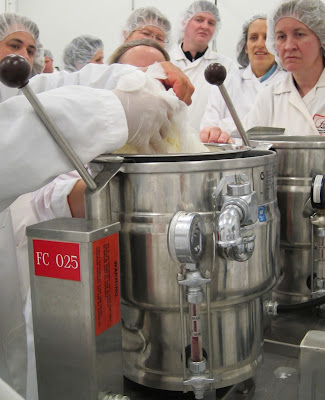Ten Reasons Why You'll Want to Visit the Glen at Crossmount
If you’re interested in local food and urban food production, you’ll want to visit The Glen at Crossmount, an agro-tourism event centre that is still under construction 5 kilometers south of Saskatoon.
The McKercher family has owned land on Highway 219 close to Cranberry Flats for generations. They spent some time pondering what to do with the land and came up with a bold, ambitious plan that includes a seniors’ village and an event centre.
I spent two hours touring the newly-opened Glen at Crossmount events centre. Here’s what I found.
Event Centre & Gardens
Glenlyon Hall is a light-filled space with large windows overlooking the pond and gardens. Word is already out about this new facility, and they have been fully booked with weddings every weekend since opening in August 2015 and they’re already fully booked for 2016. The Hall seats up to 200 people. Food is provided by Picknic’s Catering.
Weather permitting, weddings are held in the gardens, which have a Mediterranean feel with wide gravel paths and large swathes of purple-flowering catmint. Plants must be drought-tolerant. “We water them once to get them established and never again,” explains Tyler Kaban, one of two horticultural experts who are directing the agricultural activities at Crossmount.
Classes
The Glen has started offering classes for both children and adults. Many of them have a horticultural theme, such as raising orchids, which is a passion of James Dawson, Crossmount’s other horticultural expert. There’s also a variety of craft classes (e.g. winter wreath making). This fall they offered a series of environmental engineering for kids classes.
Some classes will be offered in the greenhouse giving people an opportunity to be surrounded by green, growing plants, even in the middle of winter.
“We’re still experimenting with different topics and different timeframes,” explains Amy Ta, Marketing & Business Development Manager. You’re invited to contact The Glen if you are interested in offering a class, workshop, or activity.
Bistro & Skating
Future plans include a bistro with a large outdoor patio. They’re looking for a partner to run it and hope to offer morning coffee and dainties, Sunday brunch, and fall suppers.
There will be skating on the pond once it freezes over, followed by hot apple cider.
Apple Orchard & Cider
And now we come to the part of The Glen that I find really exciting. On the far side of the pond is an apple orchard. It may not look too impressive at the moment as the trees are young dwarf varieties, but they’ve already planted 1,000 trees and plan to plant another 2,000.
Tyler Kaban is Crossmount’s apple farmer and cidermaker. He explains that they’re growing apple varieties that have been developed at the University of Saskatchewan (U of S) over the last 60 to 100 years. “We’ll be making cider from dozens of genetically distinct U of S apple varieties giving us more complex flavours,” he explains. “The cider will be unique – literally homegrown.”
The apple varieties have been chosen to provide the right balance of tannins, sugar, and acids to make a good cider. The tannins are particularly important as they provide mouth feel and colour. For the first few years, the local apples will be blended with apples from British Columbia. Tyler will be pressing his first apples this fall and plans to have cider for sale by the spring.
Initial plans are to produce a specialty cider called Farmhouse with more tannins, a darker colour, and an English style. There will also be a more familiar blend that is sweeter, highly carbonated, and refreshing. Tyler is also planning to make a hoppy cider that will appeal to craft beer drinkers and a berry cider made using Prairie berries. They’ll also be making an ice cider using apples that have frozen on the branch and a soft non-alcoholic cider.
Tyler is currently making test batches of perry using U of S pears that are high in acid and sugar and very high in tannins.
They plan to crush 150,000 pounds of apples a year in the 3,000 square foot production facility, which will produce approximately 45,000 litres of cider. The apples will be cold pressed and the soft cider sterilized with UV light to maintain flavour and quality.
The cider will be sold at Crossmount. The tasting room overlooks the Japanese garden and has a large window on to the lab where Tyler makes test batches of cider.
Bees, Grapes & a Farmers’ Market
The apple orchard is just the start of a large-scale farming operation. Tyler will be planting hardy University of Minnesota grape varieties on the slope behind the garden next spring and plans to make ice wine.
There will be a u-pick orchard of locally developed eating apples that are derived from Honey Crisp, a crisp, dense apple. The u-pick may also extend to cherries and chokeberries.
Local farmers will be invited to grow crops in a communal field and sell their produce at a weekend farmers’ market. “There are so many places where you can buy local fruit and vegetables on Valley Road,” explains Amy, “but there’s very little on this side of town.”
They are also hoping to set up beehives in the apple orchard.
The Glen at Crossmount has so much potential. Building an agricultural business is a slow process, and I commend the McKerchers for having the foresight and vision to commit resources to such a long-term project.
Upcoming Events
Fall Fest, October 31 - games & crafts, costume contest, life of a cider apple presentation at 2 pm
Cider 101, November 26 - the history and varieties of cider, guided tour of the cidery








Comments